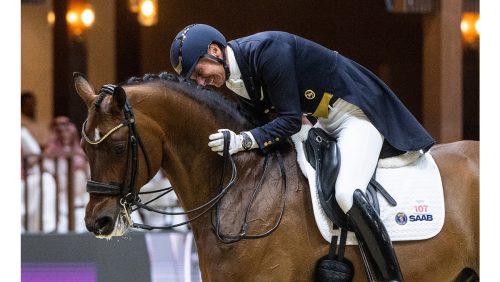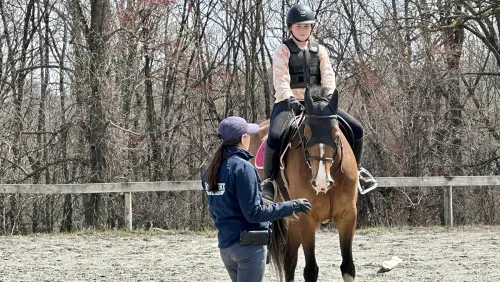“I have found through my life that you can really do anything you set your mind to, if you are willing to make sacrifices and stay with it,” Robin King said of balancing her long career in the military with owning and competing her horses.
Her Army career had her jumping out of planes, serving in Afghanistan and moving time and time again. She became a veterinarian and got her doctorate, and King still found time to ride. Career moves, horse and human injuries and life in general have given her some bumps along the way, but she continues to pursue her three-day eventing dreams.
King’s journey to three-day eventing started with an apprenticeship at an Arab barn, Al-Marah Arabians, while in college in Tucson, Ariz. After graduating in 1980, she next moved to Massachusetts to work for an Arab breeder. On the East Coast, her love of jumping led her into a position as a barn manager for a woman who owned a hunter/jumper barn. But, she says, “I was a little discouraged, because I wasn’t doing anything except getting horses ready for her to ride, then untacking them when she was done.”
King said that at the time, she was desperately poor and it seemed “that you had to have money to make a living with horses.”
So she left and joined the Army as a parachute rigger. She said, “I loved jumping out of airplanes, and when I got to my duty assignment in Kaiserslautern, Germany they found out I could type and so they put me in the operations office.” King proceeded to type her name on every jump manifest that crossed her desk, jumping 28 times in the three years she was enlisted, when only 12 jumps were required.
This first time she was stationed in Germany, King said she found a barn were she could half-lease a Trakehner mare. But because she only knew the German needed to get around town and travel, she was put in very beginner lessons. “Our lessons consisted of one horse following another,” she said.
After a year riding in circles, she met another American who rode and took King to her barn. “In Germany, in order to move up the levels you have to take a test that consists of jumping a course, riding a dressage test and taking an oral exam,” King said. She was gearing up to take her bronze level test—it was scheduled for about a week before she was supposed to leave Germany to get out of the Army.
But then the 1985 Gramm-Rudman Act was passed, putting automatic cuts on federal spending including military spending, and she found herself on her way back to the States a month early, before she could take the test.
King said, “I tell people that I have spent my whole horse career starting over. Every time I moved, I had to start over, by finding a new barn to ride, or even just getting my horses settled, or either myself or the horses recovering from injuries.”
Back in the United States, King went to veterinary school at Texas A&M and rode as much as she could afford. After graduating in 1992, she worked in private practice for year, then decided to join the Army again. “I remember driving to the Officer Basic Course in San Antonio, Texas,” she said, “wondering what I had done!”
But the military path was “the best decision for me. I liked the variety of the work and the traveling.”
She then went from San Diego to Germany again and to Russia, finding time to lease and ride horses all the while.
It was while she was back Stateside, getting her PhD in microbiology at Virginia Tech in 2001, that King got her first horse, Manny, “a chestnut Thoroughbred who was mostly crazy.”
Manny came with her from Virginia to Texas to New Jersey, doing a lot of dressage and some jumping before navicular disease ended his career.
“After that, I bought another Thoroughbred who was about 250 pounds underweight,” King said. “I named her Dreamweaver, but we called her Dee.”
ADVERTISEMENT
King loved Dee, and when she got orders to go to Kaiserlautern, Germany again, “I couldn’t leave her behind.”
She arranged with the Dutta Corp. to have Dee shipped over. “It seems silly to say that I brought my little Thoroughbred to Germany when most people go there to buy the nice warmbloods,” she said.
At this point, King said, her ability to speak German had improved, and she found a good barn, where they loved her sweet mare and King could advance her riding.
After Germany, she was assigned to a deployable unit in Fort Campbell, Ky., as commander of the 72nd Medical Detachment (veterinary services) in 2009. King found a barn in nearby Clarksville, Tenn., and brought Dee back with her. Between the shipping and the quarantine, “It was a little pricey, but I really loved this horse,” she said.

Robin King and Dreamweaver, her once-in-a-lifetime horse who accompanied her around the world. Photo courtesy of Robin King
In Tennessee she found a local club that had some cross-country fences, and, “Dee and I won the first little event we entered,” she said.
It soon came time to deploy to Afghanistan for a year on an animal medicine mission and working to assist veterinarians, farmers and government officials in development of veterinary assets in Afghanistan.
So King made arrangements with a trainer friend to board Dee in Georgia. “About two weeks before we deployed I drove her to Georgia in a raging thunderstorm,” King remembered. “Three days later I received a phone call that she tried to jump out of the pasture and impaled herself on a fence post and died.
“I still cry when I think about it.”
Coming home from Afghanistan, she was horseless again. She contacted her friend in Georgia and they went horse shopping, finding one of her current horses, Reebok. The bay gelding, “seemed like he might be very boring, but my friend encouraged me to purchase him after a year of not riding.”
Thinking down the road Reebok could be a husband horse and she would buy something more challenging later, she bought him
Reebok however decided to be a challenge himself. After bringing him home to Tennessee that December, he bucked her off the first time she rode him. She started lunging him before riding: “After a week of lunging before getting on, I thought I could get on him without it,” King said.
Nope.
“Same bucking thing, and it’s difficult to stay in the saddle when the horse bucks as you are throwing your leg over his back!” she said.
She discovered her new horse was cold-backed and would require lunging or walking before each ride, especially in cold weather. In 2011, she took Reebok with her when she and her husband Dave Smith moved to Washington’s Joint Base Fort Lewis-McChord near Seattle. There, Colonel Robin King became commander of Public Health Command Region-West.
ADVERTISEMENT
After years of having her horses shipped commercially, King finally had a truck and trailer, and she and Dave drove Reebok west themselves, stopping at horse hotels and dealing with an EHV outbreak in the western states along the way.
King has now retired from the military, but she said while in uniform, every time she got promoted she had more responsibility. In four of her last five jobs, she was unit commander, and in the veterinary corps most commands covered many states, she said.
While at Fort Lewis, her region covered 20 western states, including Alaska, leading to a lot of travel. “I averaged about five to six days of riding a week most of the time,” by scheduling trips around her horse schedule as much as possible and riding after work. This made for long days, as her workday usually started at 6:30 or 7 a.m. She wouldn’t get home from the barn until 7:30 or 8 p.m. “Fortunately, my husband is very good about it,” she said.
Reebok never turned out to be the husband horse King had hoped for, but in Washington, “I was finally able to pursue my dream of eventing.”
It started off a little rocky, at her first show. “We did pretty well in the dressage, but we had about 100 penalty points in cross-country,” she said. With no one there to help her, she went too slow and they had two refusals.
Not long later, at the annual Whidbey Island Pony Club Horse Trials, she met trainer Meika Decher. “I asked if she would coach me, and by the end of the summer, at Aspen Farms, I won my beginner novice division,” she recalled. She remebers the September 2012 event as a true highlight in her riding career.

Robin King and Reebok winning at Aspen Farms Horse Trials. Photo courtesy of Robin King
After that success, King’s goal of moving up to novice in 2013 turned out to be more than Reebok could do. After a fall and an elimination, she and Reebok focused on just learning how to enjoy riding again, “and in the fall, we started doing more jumping to get back into shape.”
Reebok then tore a ligament in his stifle and now, 2 1/2 years later, is just starting to walk under saddle. In the meantime, King bought a 6-year-old OTTB named Jonny, show name Aldebaran, after the red star that is the eye of the bull in the constellation Taurus.
Four months later, King, Smith, Jonny and Reebok moved back across the country to Maryland, when she took a position as Food Protection Program Manager at the U.S. Army Institute of Public Health in 2014. They did the hauling themselves again, stopping at horse hotels along the way.
“He is opinionated, and still learning his job,” King said of Jonny, “and last summer as we were cross-country schooling he made a greenie jump, and I ended up with a broken wrist,” King said.
She then took him to Courtney Cooper at C Square Farm for some training, “and he has come a long way.” King and Jonny went to South Carolina for 10 days and completed at the Paradise Farms Horse Trials. Just to complete was a big deal, she said, since all the action at horse shows makes Jonny very anxious and makes the warm up tough.
Her recent retirement has changed King’s intense work schedule. She and her husband were able to purchase some property with a barn, paddocks and an arena. She is still working two part-time jobs, but the horses are now right outside her door.
“I think my story is probably typical of most active military and spouses who have this ‘horse sickness,’” King said. “Some of us haven’t had to move as often, so maybe were able to get farther. Dee was my heart horse. I wonder if I’ll ever have another?”
















